What is Sleeve Gastrectomy with Proximal Jejunal Bypass in bangkok, thailand (SG PJB)
Sleeve Gastrectomy with Proximal Jejunal Bypass (SG PJB) is a type of weight loss surgery. The procedure involves removing a large portion of the stomach, leaving a small “sleeve” or tube-like stomach in its place. The remaining stomach is about the size of a banana. This reduces the amount of food that can be eaten and decreases the amount of hunger-causing hormones produced by the stomach.
The Proximal Jejunal Bypass (PJB) component of the surgery is an additional step that is done by connecting the upper part of the small intestine (the jejunum) to the newly created small stomach. This helps to decrease the absorption of calories and nutrients from food, which leads to further weight loss.
SG PJB is considered a complex surgery and it’s usually recommended for patients who are morbidly obese and have not been able to achieve weight loss through other methods.
The surgery is performed under general anesthesia and usually takes several hours. It’s important to note that, like any weight loss surgery, SG PJB carries certain risks and patients must follow a strict post-surgery diet and lifestyle regimen to ensure the best outcome.
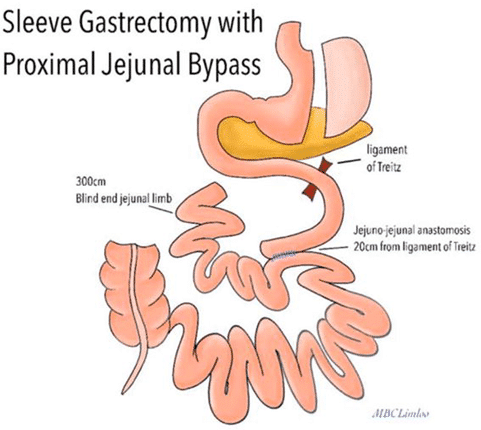
Who is eligible for Sleeve Gastrectomy with Proximal Jejunal Bypass in bangkok, thailand (SG PJB)
SG PJB is typically recommended for patients who are morbidly obese and have not been able to achieve significant weight loss through other methods.
Patients may be eligible for the surgery if they have a body mass index (BMI) of 40 or higher, or a BMI of 35 or higher with one or more obesity-related conditions such as type 2 diabetes, high blood pressure, sleep apnea, or severe joint pain. Recently studies, however, shows that cut off point could be lower is some patient especially those with diabetics type 2 or Asians ethnic.
In addition to meeting certain weight and health criteria, candidates for SG PJB should also be committed to making lifestyle changes, such as following a healthy diet and exercise regimen, to maintain weight loss after the surgery.
It’s important to note that the eligibility for weight loss surgery varies from doctor to doctor and from country to country, so it’s always recommended to consult with a bariatric surgeon to assess your individual case.
How to prepare for the surgery?
Preparing for Sleeve Gastrectomy with Proximal Jejunal Bypass (SG PJB) requires a combination of physical, mental, and emotional preparation. Here are some steps that you may need to take to prepare for the surgery:
Meet with a bariatric surgeon: A bariatric surgeon will evaluate your health and determine if you are a good candidate for SG PJB. They will also provide detailed information about the procedure and answer any questions you may have.
If you need free online consultation please contact us.
Get pre-operative tests: Your surgeon will likely require a series of tests and exams to ensure that you are healthy enough for surgery. These may include blood tests, an electrocardiogram (ECG), and a chest x-ray.
Make lifestyle changes: To prepare for the surgery, you may be asked to make changes to your diet and exercise routine. This could include losing weight, quitting smoking, and following a specific diet before the surgery.
Prepare your home: Before the surgery, you should make sure that your home is comfortable and safe for your recovery period. This may include arranging for assistance with household tasks and arranging for transportation to and from appointments.
Emotional preparation: The surgery and the recovery process can be emotionally and mentally taxing, so it is important to prepare yourself emotionally. Seek support from family and friends and consider talking to a therapist or counselor to help you cope with the changes that you will experience.
It’s important to follow your surgeon’s instructions carefully and to ask any questions you may have. By following these steps, you can help ensure that you are well-prepared for the surgery, which will help you recover more quickly and safely.
What to expect after the Sleeve Gastrectomy with Proximal Jejunal Bypass in Bangkok, Thailand (SG PJB) surgery?
Recovery after surgery can be a long and challenging process. Here are some things to expect after the surgery:
Hospital stay: After the surgery, you will stay in the hospital for several days to recover. During this time, you will be given pain medication to manage any discomfort and will be closely monitored by the medical staffs.
Pain and discomfort: You can expect to experience some pain and discomfort in the days following the surgery. Your surgeon will provide you with medication to manage the pain, and you will be taught how to care for yourself to minimize discomfort.
Limited activity: You will need to limit your physical activity for several weeks following the surgery. This will help you avoid complications and allow your body to heal properly. Exercise can be resume after 5 weeks.
Diet restrictions: After the surgery, you will be placed on a strict diet to help your stomach and intestines heal. You will start with a liquid diet for two weeks and then progress to pureed and soft foods. You will have to follow a low carb diet plan for at least six months to promote the healing process and further weight loss.
Follow-up visits: Your surgeon will schedule follow-up visits to monitor your progress and ensure that you are healing properly. Visit can be done online for your convenient.
Weight loss: You can expect to lose a significant amount of weight following the surgery, but it’s important to keep in mind that weight loss will vary from person to person, it is important to follow the guidelines of your surgeon and dietitian.
Emotional well-being: Bariatric surgery can be a big life change, and it’s normal to experience a range of emotions. It’s important to seek support from friends, family, and professionals if you need it.
Possible complications: As with any surgery, there is a risk of complications, such as infection, bleeding, and hernias. Your surgeon will discuss the potential risks with you before the surgery, and will provide instructions on how to minimize the risk of complications.
Remember that recovery time and progress will vary from person to person, and it’s important to follow your surgeon’s instructions and attend all follow-up appointments to ensure the best outcome.
Why You Should Take Care of Your Health at Rattinan Medical Center
sleeve gastrectomy with proximal jejunal bypass
in Bangkok, Thailand
- Premium Service: Close attention from start to finish of treatment, without long waiting times.
- Expert Medical Team: Guidance and consultation from experienced medical professionals.
- Experienced Surgeons: Surgeries performed by a team of experts in gastrointestinal and bariatric surgery from the USA with over 30 years of experience.
- High Volume of Successful Surgeries: Over 300 gastric surgeries per year with a high success rate.
- Modern Hospital Standards: Surgeries conducted in a hospital within the BDMS network with international standards and modern technology.
- Unique Surgical Techniques: Triple Lock technique, exclusive to Dr. Panot at Rattinan, for increased patient safety.
- Pain Less Pump technique, unique to Rattinan, for reduced post-operative pain and faster recovery.
- Post-Surgery Safety Checks: Barium Swallowing Test to ensure no gastric leakage before leaving the hospital.
- Comprehensive Post-Operative Care: Care from an expert team of obesity and diabetes surgeons.
- Private Group for advice and follow-up for up to 2 years.
- Drainage system used post-surgery to eliminate bodily waste.
- International Recognition and Standards: Continual and regular consultations from international patients, indicating trusted, world-class care.
Contact us for free online consultation :
Click For Free! Consultation Online with Certified Surgeon
Chief bariatric surgeon
The surgeon who performs the treatment
Dr. Panot Yimcharoen
Specialty
- Surgery – Bariatric and Minimally Invasive Surgery (MIS)
Educational Institutions
- Doctor of Medicine , Mahidol University. 1994
Diploma
- Board Certified of General Surgery, 1999
Postgraduate studies
- ERCP, Indiana University School of Medicine, Indiana, USA, 2547-2548
- Bariatric and Metabolic, Cleveland Clinic Education Foundation, Ohio, USA, 2552-2554
Certificate of training / Participation
2018
- 14th International Bariatric Workshop in Soft Cadaver : ASEAN Bariatric Cadaveric Workshop-2018
- 13th APPROACH TO VENTRAL HERNIA REPAIR-2018
- Hatyai MIS Conference MIS for ALL-2018
- 12th Hybrid Hernia Workshop in Soft Cadaver-2018
- The 19th Congress Of PENSA-2018
- SOCIETY OF AMERICAN GASTROINTESTINAL AND ENDOSCOPIC SURGEONS-2018
- Scientific Session&Postgraduate Course-2018
- 7th Build up your strength in various MIS procedures-2018
2019
- 15th International Hands-on Workshop-2019
- National Surgical week-2019
- 14th Asia-Pacific Congress of ELSA-2019
- The 20th CONGRESS OF PENSA-2019
- Toward a better care for emergency surgical patients-2019
- The first collaboration between RCST,JSES and I Asia Bariatric
- Cadaveric workshop-2019
- 5th Advanced Abdominal Wall Hernia Repair Master Class-2019
- SOCIETY OF AMERICAN GASTROINTESTINAL AND ENDOSCOPIC SURGEONS-2019
- Live demonstration work shop one day surgery&Lap Hernia-2019
- 360′ HERNIA WORKSHOP-2019
- Scientific Session&Postgraduate Course-2019
- LEST-THS April Festival-2019
- The 2nd International Songklangarind Obesity & Metabolic Surgery and Endoscopy-2019
- Update in General Surgery-2019
2020
- Certificate Of Attendance-2020
2023
- Asian Pacific Digestive Week-2023
- Certificate Of Appreciation-2023
- The Asia-Pacific Metabolic Bariatric Surgery Society-2023
- SOCIETY OF AMERICAN GASTROINTESTINAL AND ENDOSCOPIC SURGEONS-2023
- 2nd Advanced Course in Endoluminal Therapy and Endosuturing-2023
Atmosphere Rattinan Medical Center
Clean, safe and meet international standards
Class A surgical facility
Along with a team of expert doctors
Established 1999
Accredited by AACI (American Accreditation Commission International) 2021- current

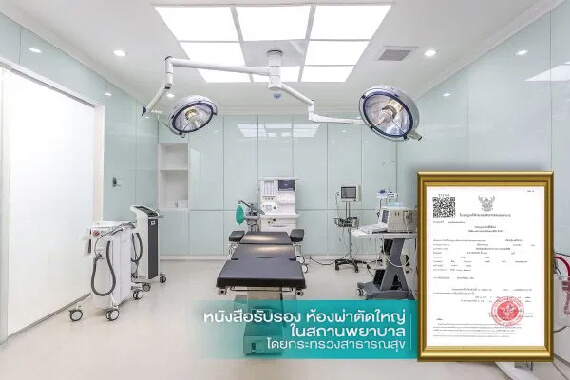
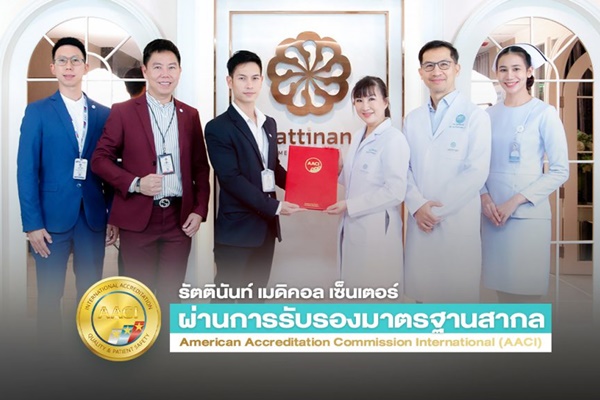
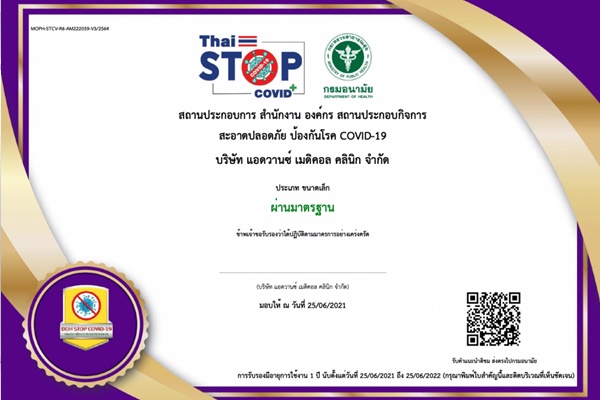

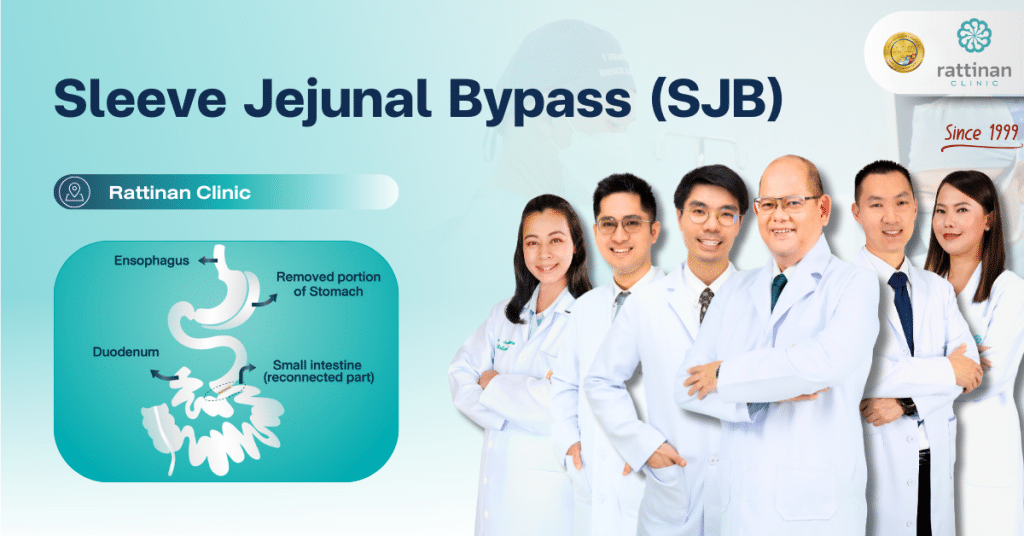



Our Expert Medical Contributors are licensed doctors and specialists who ensure every article is accurate, trustworthy, and easy to understand. Guided by our commitment to safety, care, and confidence, they provide expert insights to help patients make informed decisions. At Rattinan, we believe that knowledge is the first step to transformation.